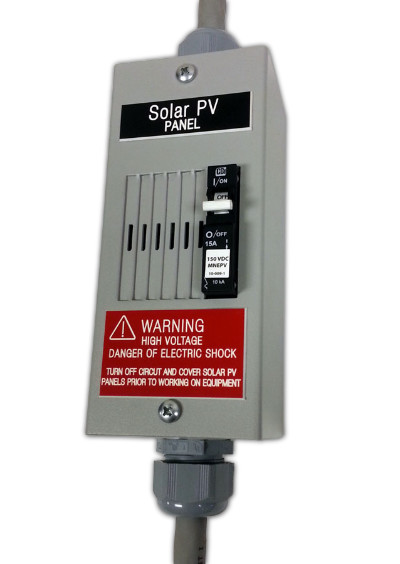Solar PV System Control & Safety For Boats
Most boat owners that have a solar renewable energy system on board are not aware of some dangers that exist with their system. Inherent with any solar system, as soon as the sun shines, is the voltage generated by the solar panel (s). The solar PV voltage levels always exceed the nominal 12.8 V that most boats operate on and therefore it is considered high-voltage. Without the proper disconnects, grounds and labeling a dangerous condition exists.
Solar panel system voltages can range anywhere from 18 VDC to above 90 VDC depending upon how the system has been designed and connected. Larger solar PV systems will typically have 3 or 4 panels wired in series to minimize installation complexity and to optimize the energy harvesting from the sun. For example a 66 VDC system (2,3 or 4 panels wired in series) is significantly higher than the 12 nominal battery system which is high-voltage that can be lethal and dangerous to the unsuspecting service man or the do-it-yourself skipper… Remember turning off the battery switches does not turn off the solar PV voltage that is present on board the ship when the sun is shining. Having a clearly marked solar disconnect switch is highly recommended. The on-off switch must have a DC voltage rating greater than the open circuit voltage for the solar array and is typically a circuit breaker.

LEAVING YOUR BOAT:
If your plans are to be off the boat for period of time, turning off the battery switches and leaving the solar active is a common practice as this will keep your batteries topped off through its regulator. But suppose you wanted to turn off your solar system as well, how would you do that? The charge controller (solar regulator) connects between the solar panel and house batteries is protected by a fuse or a circuit breaker on the battery side. Charge controllers do not have a on-off switch and by just removing the fuse or opening the circuit breaker (especially at high noon) could cause the controller to fail plus the solar PV high-voltage would still be present at the charge controller. A solar on-off switch would be desirable.
SERVICING THE BOAT:
If your boat needs servicing, most technicians will turn off the battery switches thinking all power has been disconnected. But all systems are not turned off because the solar panels are actively charging the batteries through their charge controller and high voltages are present. This is a dangerous situation for the would be service person who believes it is safe because the battery switches are turned off. Easily accessible and clearly marked on-off switch would be a simple solution
MARKING SOLAR TURN-OFF:
 Would a person unfamiliar with the ship’s systems be able to determine how to turn off the solar? Having a well marked on-off switch for the solar is an important part of your systems safety and control. The solar on-off should have a clearly marked label indicating its function, the potential voltage that is present and the danger associated with it being turned “on”. Since the solar is an independent energy source and is of high-voltage, the need for clear identification is critical.
Would a person unfamiliar with the ship’s systems be able to determine how to turn off the solar? Having a well marked on-off switch for the solar is an important part of your systems safety and control. The solar on-off should have a clearly marked label indicating its function, the potential voltage that is present and the danger associated with it being turned “on”. Since the solar is an independent energy source and is of high-voltage, the need for clear identification is critical.
GROUNDED SOLAR PV ARRAY:
Given the high-voltage potential on a solar PV system, the need for proper grounding is critical. If the solar panels were to have a “electrical leak” to the panels frame, high-voltage could be present on the mounting structure causing serious injury. Grounding the solar array to the ships ground is a critical part of the system installation and should not be overlooked. For additional information on grounding please refer to our reference documents on grounding the solar array.
RECOMMENDATIONS:
- Always install a disconnecting device between the solar panels and the charge controllers.
- Always label the high voltage circuits and disconnects for the solar.
- Always ground your solar array to ship ground.